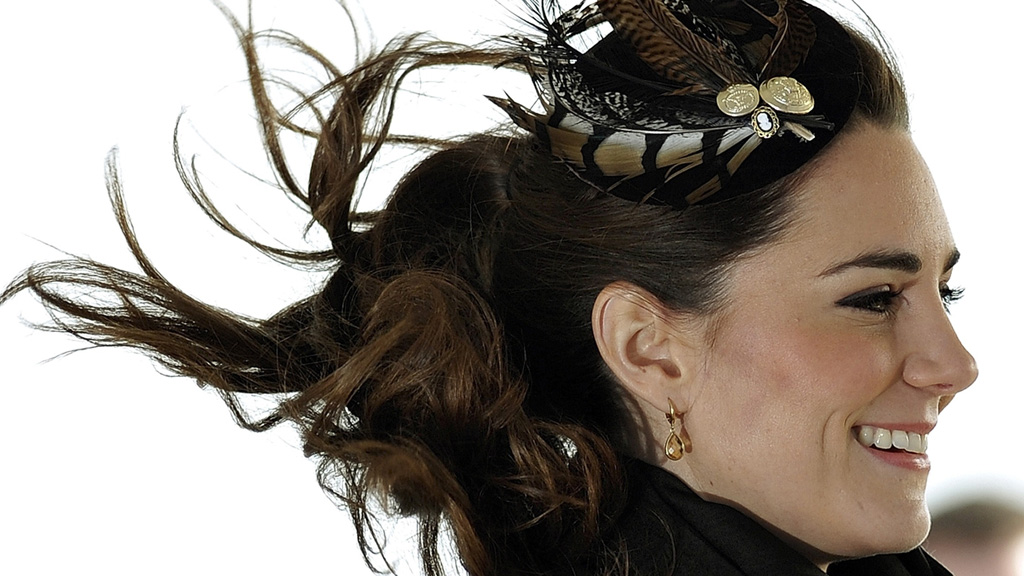Hyperemesis gravidarum: I suffered like Kate
With Kate Middleton in hospital suffering from acute morning sickness, author Sonia Purnell says she knows exactly what the royal couple are going through.

The news of Kate’s admission to hospital suffering from hyperemesis gravidarum brought my own suffering back in an instant. It is not something that ever quite leaves you – even after 15 years.
I remember the excitement at the thought of my first baby on the way. Equally, if not more, memorable is the violent onslaught of nausea at about four weeks.
Kindly souls offered me ginger biscuits, nausea bands, cups of peppermint tea. But still the nausea and the metallic taste in my mouth just got worse. It felt as if I was being poisoned. The nausea was there constantly; the actual vomiting could be triggered by almost anything from certain colours (a certain pinky-red still triggers a slight panic today), smells and any attempt to eat or even drink, even sips of water.
At its peak I was sick up to 30 times a day. My then GP was, however, at first dismissive – even though by the time I went to see her I had kept nothing down for 10 days.
“It will get better by itself,” she said, turning away. Only when I failed to make it to the door of her surgery because her perfume triggered another spasm did she agree to take my pulse and blood pressure.
At its peak I was sick up to 30 times a day. My then GP was, however, at first dismissive – even though by the time I went to see her I had kept nothing down for 10 days.
Fortunately, she then decided to send me to hospital in a cab, although by the time it came, my head was pounding, I was beginning to feel quite confused, and my skin was dry and taut. I had to lean out of the window to try to stop being ill.
At Queen Charlotte’s, a specialised maternity hospital in west London, they were at last understanding. There is something isolating about this condition – when you compare it to the way so many women make pregnancy look easy. All my family could do is look on in helpless horror.
Yet up to one-in-50 women can suffer some form of hyperemesis gravidarum (literally, very bad pregnancy sickness) but only a handful have it as bad as I did.
I saw on my notes that I had three “+” signs against my diagnosis, meaning I was a particularly severe case. It is likely it became so serious because I was not treated straight away. I trust that Kate, however, is receiving the early and aggressive treatment she needs to keep it under control.
One of the immediate steps is likely to be rehydration. Doctors put me on an intravenous drip, swapping the bags between saline, sugar and potassium. They were what was keeping both my baby and me alive.
At first the vomiting continued. One terrible night – the loneliest of my life – I remember I was bringing up scary quantities of blood. It turned out that I had ripped my oesophagus, which was excruciating as the bile (by now the only contents of my stomach) burned the wound as it passed up through my body.
The doctors put me in a room on my own and posted a “nil by mouth” sign above my bed, as anything passing my lips could trigger yet more vomiting. Even a toothbrush was banned.
Meanwhile, they started to pump Zantac (normally used for ulcers but intended to help my oesophagus heal in this case with a protective coating) and anti-emetics into my veins through another canula. Soon this became so uncomfortable so the drugs were injected instead. My backside was soon too black and blue to lie on – I felt beaten up inside and out.
The doctors explained that my body was reacting to the pregnancy hormone HCG (human chorionic gonadotropin). HCG can cause the mildest of reactions such slight morning sickness or a virtual bodily shutdown such as mine.
I just hope that Kate is not at my end of the spectrum – and that her suffering passes, as it sometimes does, at around 13 weeks.
I just hope that Kate is not at my end of the spectrum – and that her suffering passes, as it sometimes does, at around 13 weeks. Mine continued at varying levels (requiring further hospitalisations) right to the end. I lost a lot of weight, even though I was pregnant.
My condition also almost certainly triggered my waters breaking at 33 weeks and the premature birth of my son, with yet further complications.
I hope Kate will be lucky and that early intervention will save her some of the agonies I endured. Treatment is improving as is recognition of the condition.
Yet I wanted to believe it could not be so bad next time. So I got pregnant again two years later. Sadly, it was just as hellish. I stopped at two children; I would not be surprised if the royals do the same.
Sonia Purnell is the author of a biography of London Mayor Boris Johnson